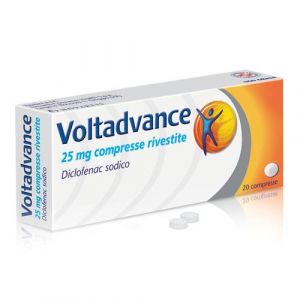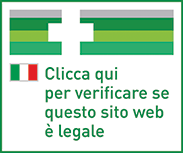Ship in Europe, Find out rates!

Voltadvance 20 Coated Tablets 25 Mg
NOVARTIS
Voltadvance Tablets is used in the treatment of various types of pain such as, for example, pain in the joints, lumbago, muscle pain, head and tooth pain, menstrual pain; as an adjuvant in the therapy of influenza and in febrile states.
Therapeutic indications
Voltadvance Tablets is used in the treatment of various kinds of pain such as, for example, pain in the joints, lumbago, muscle aches, head and toothaches, menstrual pains and as an adjunct in the therapy of flu and in febrile states.
Dosage and method of use
Voltadvance Tablets are administered in the following doses:
Do not exceed the recommended dose; in particular elderly patients must follow the minimum dosages indicated above.
The coated tablets should be swallowed whole, with water or other liquid. We recommend taking the product preferably on a full stomach.
As an antifebrile use the product for a maximum of 3 days. As an analgesic, do not exceed 5 days of treatment. Undesirable effects can be minimized by administering the lowest effective dose for the shortest duration necessary to control symptoms.
Contraindications
Hypersensitivity to the active substance or to any of the excipients; Active gastrointestinal ulcer, bleeding or perforation; History of gastrointestinal bleeding or perforation related to previous NSAID treatment or history of recurrent peptic ulcer / haemorrhage (two or more distinct episodes of proven ulceration or bleeding); Last trimester of pregnancy and during lactation; Severe liver failure, severe kidney failure or severe heart failure; Like other non-steroidal anti-inflammatory drugs (NSAIDs), diclofenac is also contraindicated in patients in whom asthma attacks, urticaria or acute rhinitis, anaphylactic or anaphylactoid reactions have occurred after taking acetylsalicylic acid or other NSAIDs; the product must not be used in case of hematopoiesis alterations; In case of intensive diuretic therapy; The product should not be taken in case of dark or bloody stools; Overt congestive heart failure (NYHA class II-IV), ischemic heart disease, peripheral arterial disease and / or cerebral vasculopathy; The medicine should not be given to children younger 'less than 14 years. Special warnings
Undesirable effects can be minimized by using the lowest effective dose for the shortest possible duration of treatment needed to control symptoms. Avoid using diclofenac concomitantly with other systemic NSAIDs, due to lack of any evidence demonstrating synergistic benefits and based on potential additive side effects. Allergic reactions, including anaphylactic / anaphylactoid reactions, may also occur in rare cases without prior exposure to diclofenac. Diclofenac can mask the signs and symptoms of infections due to its pharmacodynamic properties.
Caution is required in the elderly. Particularly in frail elderly patients or in those with a low body weight, the use of the lowest effective dose is recommended. Prolonged use of any type of pain reliever for headaches can make them worse. If this situation has occurred or is suspected, discontinue treatment.
The diagnosis of drug overuse headache (MOH) should be suspected in patients who have frequent or daily headaches despite regular use of headache medications. They have been reported and may appear at any time, with or without warning symptoms or a previous history of serious gastrointestinal events, gastrointestinal bleeding, ulceration or perforation, which can be fatal. They generally have more serious consequences in the elderly.
If gastrointestinal bleeding or ulceration occurs in patients receiving diclofenac, the medicinal product should be discontinued. Close medical surveillance is mandatory and particular caution should be used when prescribing diclofenac to patients with symptoms indicative of gastrointestinal (GI) disorders or with a history indicative of gastric or intestinal ulceration, bleeding or perforation, chronic inflammatory bowel disease. The risk of GI bleeding is higher with increased doses of NSAIDs and in patients with a history of ulcer, especially if complicated with haemorrhage or perforation.
The elderly have a higher frequency of adverse reactions, especially gastrointestinal bleeding and perforation which can be fatal. To reduce the risk of GI toxicity in patients with a history of ulcer, particularly if complicated with haemorrhage or perforation, and in the elderly, initiate and maintain treatment at the lowest effective dose.
Concurrent use of protective agents consider for these patients and also for patients requiring concomitant use of medicinal products containing low dose acetylsalicylic acid (ASA) or other medicinal products that may increase gastrointestinal risk. Caution is advised in patients taking concomitant medications that may increase the risk of ulceration or bleeding, such as systemic corticosteroids, anticoagulants, antiplatelet agents or selective serotonin reuptake inhibitors. Also in patients with ulcerative colitis or Crohn's disease exercise close medical surveillance and caution as these conditions can be exacerbated. Close medical surveillance is required when prescribing diclofenac to patients with hepatic insufficiency as their condition may be exacerbated. As with other NSAIDs, including diclofenac, the values of one or more liver enzymes may increase.
During prolonged treatment with diclofenac, regular checks of liver function are indicated as a precautionary measure. If liver function parameters are persistently altered or worsened, if clinical signs or consistent symptoms of liver disease develop, or if other manifestations occur, discontinue treatment.
Hepatitis with diclofenac use can occur without prodromal symptoms. Caution should be exercised in the use of diclofenac in patients with hepatic porphyria, as it may trigger an attack. Since fluid retention and edema have been reported in association with NSAID therapy, particular caution is required in case of renal insufficiency, a history of hypertension, in the elderly, in patients receiving concomitant treatment with diuretics or with medicinal products that may significantly affect the renal function and in those patients with a substantial depletion of extracellular volume due to any cause. In such cases, monitoring of renal function is recommended as a precaution when administering diclofenac. Discontinuation of therapy is usually followed by a return to pre-treatment conditions.
Serious skin reactions, some of them fatal, including exfoliative dermatitis, Stevens-Johnson syndrome and toxic epidermal necrolysis, have been reported very rarely in association with the use of NSAIDs. In the early stages of therapy, patients appear to be at higher risk for these reactions: the onset of the reaction occurs in most cases within the first month of treatment. Discontinue the drug at the first appearance of skin rash, mucosal lesions or any other sign of hypersensitivity '.
Caution is required before initiating treatment in patients with a history of hypertension as fluid retention, hypertension and edema have been reported in association with NSAID treatment. Clinical trials and epidemiological data consistently indicate an increased risk of arterial thrombotic events associated with the use of diclofenac, especially at high doses (150 mg / day) and with long-term treatment. Available data do not suggest an increased risk with the use of low dose diclofenac 25 mg up to 100 mg / day. Patients with significant risk factors for cardiovascular events should only be treated with diclofenac after careful consideration. Since the cardiovascular risks of diclofenac may increase with dose and duration of exposure, the shortest possible duration and lowest effective daily dose should be used. The response to therapy and the need for symptom improvement should be reassessed periodically.
During prolonged treatment with diclofenac, blood count checks are recommended. Diclofenac can temporarily inhibit platelet aggregation. Monitor patients with hemostasis defects. In patients with asthma, seasonal allergic rhinitis, swelling of the nasal mucosa, chronic obstructive pulmonary diseases or chronic respiratory tract infections, reactions to NSAIDs such as exacerbation of asthma, Quincke's edema or urticaria are more frequent than in other patients.
Pregnancy and breastfeeding
Inhibition of prostaglandin synthesis can negatively affect pregnancy and / or embryo / fetal development. Results of epidemiological studies suggest an increased risk of miscarriage and cardiac malformation and gastroschisis after use of a prostaglandin synthesis inhibitor in early pregnancy. The risk was believed to increase with dose and duration of therapy.
In animals, administration of prostaglandin synthesis inhibitors has been shown to cause an increase in pre- and post-implantation loss and embryo-fetal mortality. Furthermore, an increased incidence of various malformations, including cardiovascular, has been reported in animals administered prostaglandin synthesis inhibitors during the organogenetic period. During the first and second trimester of pregnancy, diclofenac should not be administered except in strictly necessary cases. If diclofenac is used by a woman attempting to conceive, or during the first and second trimester of pregnancy, the dose should be kept as low as possible and the duration of treatment should be as short as possible.
During the third trimester of pregnancy, all prostaglandin synthesis inhibitors can expose the fetus to: cardiopulmonary toxicity (with premature closure of the arterial duct and pulmonary hypertension); renal dysfunction, which can progress to renal failure with oligo-hydroamnios; the mother and the newborn, at the end of pregnancy, to: possible prolongation of the bleeding time, and antiplatelet effect which can occur even at very low doses; inhibition of uterine contractions resulting in delayed or prolonged labor.
Consequently, diclofenac is contraindicated during the third trimester of pregnancy. Diclofenac passes into breast milk in small amounts. Therefore, diclofenac should not be administered during breastfeeding to avoid undesirable effects in the infant. The use of diclofenac can affect female fertility and is not recommended in women who wish to conceive. The suspension of diclofenac should be considered in women who have difficulty conceiving or who are undergoing investigation of infertility.
Expiry and retention
Check the expiration date indicated on the package. The expiry date indicated on the package refers to the product in intact packaging, correctly stored.
Warning: do not use the medicine after the expiry date indicated on the package.
Composition
Voltadvance Tablets contains:
Active ingredient: diclofenac sodium 25 mg
Excipients: potassium bicarbonate; mannitol; sodium lauryl sulfate; crospovidone; magnesium stearate; glycerol dibeenate; Clear Opadry (hypromellose; macrogol).
| Destination | Cost | Detail |
|---|---|---|
| Italy | €5,90* | 24/72H |
| Austria, France, Germany, Slovenia | € 13* | 3 days |
| Belgium, Luxembourg, Portugal, Netherlands, Spain | € 14* | 4 days |
| Bulgary, Cechia, Hungary, Poland, Romania, Slovakia | € 19* | 5 days |
| Denmark, Estonia, Finland, Ireland, Lithuania, Latvia ,Sweden | € 22* | 5 days |
| United Kingdom, Switzerland, Greece | € 30* | 7 days |
| Canada, USA | € 40 | 7 Days |
European shipments with express courier: FedEx, MBE, DHL
*For the shipment outside band B ther's an extra cost of 22€ *For the shipment outside band C ther's an extra cost of 30€ Delivery Times exclude Saturday and Holidays
For Islands and Areas of difficult Accessibility the shipments are made in 72 hours and the cost will be increased by 15€
